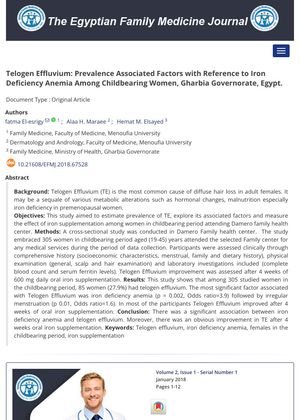Telogen Effluvium: Prevalence and Associated Factors with Reference to Iron Deficiency Anemia Among Childbearing Women, Gharbia Governorate, Egypt
January 2018
in “
The Egyptian Family Medicine Journal
”

TLDR Iron deficiency anemia is significantly linked to hair loss in childbearing women, and taking iron improves the condition.
The study conducted by El-esrigy, Maraee, and Elsayed in 2017 involved 305 childbearing women aged 19-45 years and aimed to estimate the prevalence of Telogen Effluvium (TE), a common cause of diffuse hair loss in adult females, and its associated factors. The study found that 27.9% (85 women) had TE, with iron deficiency anemia being the most significant associated factor (p = 0.002, Odds ratio=3.9), followed by irregular menstruation (p 0.01, Odds ratio=1.6). After 4 weeks of daily oral iron supplementation of 600 mg, most participants showed improvement in TE. The study concluded that there was a significant association between iron deficiency anemia and TE, and that iron supplementation led to an improvement in TE.




